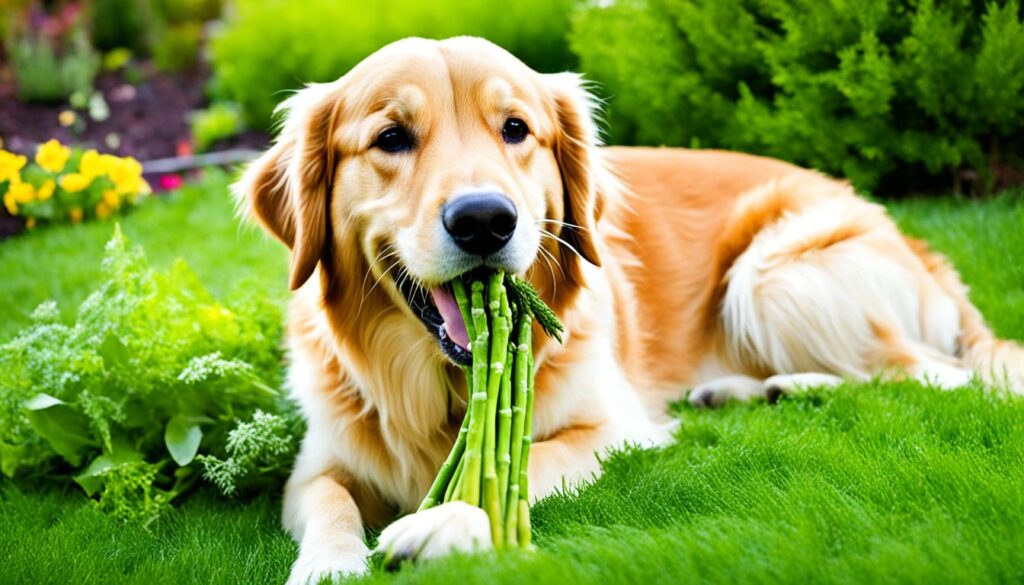As an Amazon Associate I earn from qualifying purchases.
Picture this: a sunny afternoon, a gentle breeze in the air, and your furry companion sitting by your side, eagerly waiting for a bite of the fresh asparagus you’re about to enjoy. As you savor the crisp, green stalks, a question pops into your mind – can dogs eat asparagus too?
We all want to share the joys of our meals with our beloved pets, but when it comes to their diet, it’s essential to ensure that every morsel is safe and beneficial for their well-being. So, let’s dive into the world of asparagus and find out if this vegetable can be a part of your dog’s mealtime bliss.
Key Takeaways:
- Asparagus is safe for dogs to eat, but it should be prepared and fed in moderation.
- Chop the asparagus into small pieces to make it easier for your dog to chew and digest.
- Cook the asparagus lightly before serving it to your furry friend to improve its digestibility.
- Avoid adding butter or cooking oil to the asparagus when preparing it for your dog.
- Keep the asparagus fern, which is the inedible part of the plant, out of your dog’s reach as it is toxic.
Is Asparagus Good for Dogs? The Benefits and Risks.
As a dog owner, you may be wondering if it’s safe to share some of your favorite veggies like asparagus with your furry friend. The good news is that asparagus is not only safe for dogs, but it also offers a range of health benefits. Let’s take a closer look at the advantages of incorporating asparagus into your dog’s diet, as well as the potential risks.
“Asparagus: A Nutritional Powerhouse for Your Pooch.”
The Nutritional Goodness of Asparagus
When it comes to canine nutrition, asparagus is a wonderful addition to your fur baby’s diet. This green veggie is packed with essential vitamins and minerals that can contribute to their overall well-being. Asparagus contains vitamins A, C, K, and B-complex, which are vital for a healthy immune system, a shiny coat, strong teeth, and sturdy bones.
Our furry friends can also benefit from the mineral content in asparagus, such as potassium and iron. Potassium helps regulate heart function and maintains healthy muscle contractions, while iron supports the production of red blood cells, which deliver oxygen throughout a dog’s body.
By incorporating asparagus into your dog’s diet, you’re providing them with a low-calorie, nutrient-dense food that can contribute to their overall health and well-being.
Risks to Consider
While asparagus has numerous health benefits, it’s essential to be aware of a few risks associated with feeding it to your dog. Raw asparagus can be tough and difficult to chew, making it a potential choking hazard. To prevent any mishaps, make sure to cut the asparagus into small, bite-sized pieces that are easier for your dog to handle.
In addition to potential choking hazards, asparagus fern, a non-edible part of the asparagus plant, is toxic to dogs if ingested. Be sure to keep your furry friend away from any asparagus fern to avoid any gastrointestinal discomfort.
| Benefits of Asparagus for Dogs | Risks of Asparagus for Dogs |
|---|---|
| Maintains a healthy immune system | Potential choking hazard if not cut properly |
| Promotes a shiny coat and strong teeth | Asparagus fern is toxic to dogs |
| Supports sturdy bones | |
| Provides essential vitamins and minerals |
“Remember: Small, Safe, and Nutritious Bites for Your Pooch!”
When adding asparagus to your dog’s diet, it’s essential to remember a few key points. Cooked asparagus is easier for dogs to chew and digest, reducing the risk of any digestive discomfort. Avoid adding any harmful ingredients like butter, salt, or garlic, as these can be detrimental to your dog’s health.
Instead, opt for simple steamed or boiled asparagus without any additives. Remember to cut the asparagus into small, dog-friendly pieces and offer it as an occasional treat or food topper rather than a main component of their diet.
How to Safely Feed Asparagus to Your Dog.
When it comes to feeding asparagus to your furry friend, safety is paramount. Here are some essential tips to ensure your dog enjoys this dog-friendly vegetable without any risks:
- Cook it properly: Steaming or boiling the asparagus without any additives is the best way to prepare it for your dog. Avoid adding harmful ingredients such as butter, salt, or garlic, as they can be harmful to your pup’s health.
- Cut into bite-sized pieces: To prevent choking, it’s recommended to cut the asparagus into small, bite-sized pieces. This way, your dog can enjoy the vegetable without any difficulty.
- Moderation is key: Asparagus should be given to your dog in moderation, either as a treat or as a food topper. It should not be the main part of their diet. Remember, a well-balanced dog diet should include a variety of foods.
- Portion size: The portion size of asparagus depends on the size of your dog. Smaller dogs should receive smaller amounts of asparagus, while larger dogs can have slightly more. Consult with your veterinarian to determine the appropriate portion size for your furry friend.
By following these guidelines, you can safely incorporate asparagus into your dog’s diet and provide them with additional nutritional benefits.
| Feeding Asparagus to Your Dog – Safety Tips: |
|---|
| 1. Cook asparagus properly: Steaming or boiling without additives. |
| 2. Cut into bite-sized pieces to prevent choking. |
| 3. Feed in moderation as treats or food toppers. |
| 4. Consult with your veterinarian for portion size. |

“Feeding your furry friend asparagus can be a delightful experience. Just remember to prioritize safety and moderation for their well-being.”
The Benefits of Asparagus for Dogs.
Asparagus isn’t just for humans — it has numerous health benefits for our furry friends too! Adding asparagus to your dog’s diet can provide a range of nutrients that promote overall well-being. Let’s take a closer look at the health benefits of asparagus for dogs.
Vitamins for Immunity: Asparagus is packed with essential vitamins like A, C, and K, which play a vital role in supporting your dog’s immune system. These vitamins help strengthen your dog’s defenses, keeping them healthy and resilient.
Digestive Health: Asparagus is rich in dietary fiber, an important nutrient for maintaining a healthy digestive system in dogs. Fiber aids in digestion and helps regulate bowel movements, keeping your pup’s tummy happy and functioning smoothly.
Powerful Antioxidants: The antioxidants found in asparagus help eliminate harmful toxins and free radicals from your dog’s bloodstream. This process contributes to improved overall health and may even help prevent certain diseases.
Essential Minerals: Asparagus contains essential minerals like potassium, iron, and manganese, which are necessary for various bodily functions in dogs. These minerals support bone strength, aid in muscle function, and contribute to a shiny coat.
With all these health benefits, it’s clear that asparagus can be a wonderful addition to your dog’s diet. Just like humans, our canine companions can benefit from the nutrient-rich goodness of this vegetable.
To visualize the nutritional content of asparagus for dogs, take a look at the table below:
| Nutrient | Amount per 100g of Asparagus |
|---|---|
| Vitamin A | 1466 IU |
| Vitamin C | 5.6 mg |
| Vitamin K | 41.6 mcg |
| Potassium | 202 mg |
| Iron | 2.14 mg |
| Manganese | 0.158 mg |
Note: These values may vary depending on the source and freshness of the asparagus.
By incorporating asparagus into your dog’s diet, you’re providing them with a range of essential nutrients that contribute to their overall health and well-being. Remember to introduce asparagus gradually and in moderation, and consult with your veterinarian if you have any concerns about your dog’s specific dietary needs.

Next, we’ll explore the potential risks associated with feeding asparagus to dogs, so you can make informed decisions about your pet’s nutrition.
The Risks of Asparagus for Dogs.
While asparagus is generally safe for dogs to eat, it’s important to be aware of the potential risks associated with feeding it to them. Here are a few things to keep in mind:
- Raw Asparagus: Raw asparagus can be tough for dogs to chew and digest, which may result in choking or gastrointestinal discomfort. It’s recommended to cook the asparagus before feeding it to your furry friend to make it easier to chew and digest.
- Avoid Harmful Ingredients: When preparing asparagus for your dog, it’s crucial to avoid adding any harmful ingredients, such as butter, salt, or garlic. These can be toxic to dogs and may lead to various health problems. Stick to simple and plain preparations of asparagus.
- Toxic Asparagus Fern: While the edible part of the asparagus plant is safe, the asparagus fern, which is the inedible part, is toxic for dogs. Make sure to keep the fern out of your dog’s reach to prevent accidental ingestion.
Introducing any new food into your dog’s diet should always be done gradually and in small portions. It’s essential to monitor your dog for any adverse reactions or sensitivities. If you have any concerns or questions, consult with your veterinarian.
Remember:
Asparagus can be a healthy addition to your dog’s diet, but it should be given in moderation and prepared properly to avoid any potential risks. By following these guidelines, you can safely share the benefits of this dog-friendly vegetable with your furry companion.
Conclusion
In summary, asparagus can be a safe and nutritious addition to your dog’s diet, but it’s important to exercise caution and follow proper guidelines. While dogs can eat asparagus, it should be given in moderation and prepared in a way that is easily digestible for them. Asparagus offers several health benefits for dogs, including vitamins, minerals, and dietary fiber. However, it’s essential to be aware of the potential risks, such as choking hazards and digestive discomfort.
Before introducing asparagus to your dog’s diet, it’s advisable to consult with your veterinarian to ensure it aligns with their specific nutritional needs. Asparagus should be seen as a treat or occasional addition to their regular diet rather than a primary food source. Remember to cut the asparagus into small pieces to prevent choking and avoid adding any harmful ingredients like butter, salt, or garlic.
When feeding asparagus to your furry friend, always prioritize their safety and well-being. While asparagus is generally safe for dogs, every dog is unique, and their reactions to new foods may vary. By following these guidelines and consulting with your veterinarian, you can make informed decisions about incorporating asparagus and other dog-friendly vegetables into your dog’s diet.
FAQ
Can dogs eat asparagus?
Is asparagus good for dogs?
How should I feed asparagus to my dog?
What are the benefits of asparagus for dogs?
Are there any risks associated with feeding asparagus to dogs?
Source Links
- https://www.akc.org/expert-advice/nutrition/can-dogs-eat-asparagus/
- https://www.petmd.com/dog/nutrition/can-dogs-eat-asparagus
- https://www.pethonesty.com/blogs/blog/can-dogs-eat-asparagus
As an Amazon Associate I earn from qualifying purchases.

